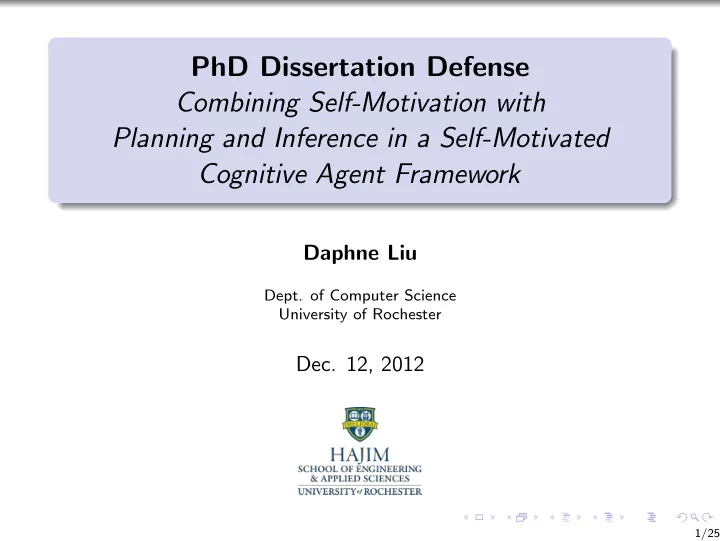

PhD Dissertation Defense Combining Self-Motivation with Planning and Inference in a Self-Motivated Cognitive Agent Framework Daphne Liu Dept. of Computer Science University of Rochester Dec. 12, 2012 1/25
Motivation & Contributions How do we integrate them? Planning and Self-Motivation Reasoning “fulfillment of user goals” “Utility-optimizing mappings” Vision: Linguistically competent, intelligent, human-like agents 1 Bridge the planning & reasoning agent paradigm and the self-motivated agent paradigm. 2 Demonstrate the feasibility of combining planning, inference, and dialogue in a self-motivated cognitive agent. 3 Offer a versatile and easy-to-use self-motivated cognitive agent framework with competitive empirical results. 2/25
Self-Motivated Cognitive Agent Framework Continual planning and self-aware reasoning aimed at optimizing long-term, cumulative rewards Planning treated as continually constructing, evaluating, and (partially) executing sequences of potential actions Cognitive system: ability to plan and reason with an expressively rich language Design Open to User User-designed actions and utility-measuring functions for actions and states User-specified “gridworld” roadmap placing entities at named locations with roads 3/25
High-Level Overview of Agent Motivated Explorer (ME) Should I drink the World juice or walk to Grove? Relationships Self Path Home Grove Knowledge-based reasoning about actions and future states Motivated by consideration of the long-range utility of choices 4/25
ME’s View of the World KB a5 is a book. I own a5. Guru likes a5. a5 is readable. .... .... .... ME’s Knowledge Facts about itself, the current situation, and the world General knowledge inference rules Capable of inferences and introspection Compared with the God’s-eye view of the world, ME’s view may be incomplete, inaccurate or outdated. 5/25
Planning and Execution . . . . . drink . . walk . sleep . . . . . . Lookahead in Planning and Execution 1 Search forward from a given state. 2 Propagate back expected rewards and costs of applicable actions and resulting states. 3 Execute the first action of the seemingly best plan. 4 Update knowledge. 6/25
Model vs. Actual Operators ME’s incomplete knowledge of the world Exogenous events (rain and fire) & multi-step actions Example: A fire may start and disrupt ME’s travel. How are the two versions used? 1 Model version of ME’s applicable actions contemplated in forward projection 2 Actual, stepwise version of ME’s chosen action executed, updating ME’s knowledge and the world 7/25
Example: Model Version of the Sleep Operator (setq sleep (make-op :name 'sleep :pars '(?f ?h) :preconds '((is_at ME home) (is_tired_to_degree ME ?f) (>= ?f 0.5) (> ?f ?h) (not (there_is_a_fire)) (is_hungry_to_degree ME ?h)) :effects '((is_tired_to_degree ME 0) (not (is_tired_to_degree ME ?f)) (is_hungry_to_degree ME (+ ?h 2))) :time-required '(* 4 ?f) :value '(* 2 ?f) )) 8/25
Example: Actual Version of the Sleep Operator (setq sleep (make-op :name 'sleep.actual :pars '(?f ?h) :startconds ' ((is_at ME home) (is_tired_to_degree ME ?f) (>= ?f 0.5) (> ?f ?h) (is_hungry_to_degree ME ?h)) :stopconds '((there_is_a_fire) (is_tired_to_degree ME 0)) :deletes '((is_tired_to_degree ME ?#1) (is_hungry_to_degree ME ?#2)) :adds ' ((is_tired_to_degree ME (- ?f (* 0.5 (elapsed_time?)))) (is_hungry_to_degree ME (+ ?h (* 0.5 elapsed_time?))))) )) 9/25
Question-Answering Conveyance of Knowledge >> (listen!) You're welcome to ask ME a question. ((ask-yn user (guru can_talk)) (ask-wh user (?y is_animate))) ======================================================= >> (go!) STEP TAKEN: (ANSWER_USER_YNQ (CAN_TALK GURU)) GURU CAN TALK. For question (CAN_TALK GURU), according to ME's current knowledge base, ME oers the answer above. >> (go!) STEP TAKEN: (ANSWER_USER_WHQ (IS_ANIMATE ?Y)) ME IS ANIMATE. GURU IS ANIMATE. For question (IS_ANIMATE ?Y), other than the above positive instance(s) that ME knows of, ME assumes nothing else as the answer. 10/25
Use of (Restricted) Closed World Assumption Complete self-knowledge; true or false Relaxed CWA for a non-ME subject; true , false , or unknown Restricted CWA ME applies the CWA only for the two following cases: 1 literals about road connectivity and navigability; e.g., the absence of ( road path 5); 2 (a) when the subject is a local entity currently colocated with ME or one ME has visited, and (b) the predicate is non-occluded. 11/25
Inference Derivation Types of Inference 1 Agent’s knowledge in conjunction with general knowledge 2 Autoepistemic inferences 3 Epistemic inferences by simulative inference Examples of General Inferences Adding a rule to *general-knowledge*: (push (list (list obj-type '?x) '=> (list property-i '?x)) *gen-knowledge*) Definition of object types and respective properties: ( def-object 'expert '(is_animate can_talk)) ( def-object 'musical_instrument '(is_inanimate playable)) General inferences: ( all-inferences '[(expert guru), (musical_instrument piano)], *gen-knowledge*, *inf-limit*) => (is_animate guru), (can_talk guru), (is_inanimate piano), (playable piano) 12/25
Inference Derivation Simulative Inference Assumptions (only for animate entities) All AEs, like ME, have self-knowledge. All non-ME AEs are stationary. All AEs know of colocated objects, and all nonoccluded facts about such objects. Examples of Autoepistemic and Simulative Inferences Assumptions: *visited-objects* = {guru}, *occluded-preds* = {likes, knows} // Autoepistemic Inferences ACTION: (ANSWER_YNQ (NOT (IS_BORED ME))) Answer: IT IS NOT THE CASE THAT ME IS BORED. ACTION: (ANSWER_YNQ (CAN_FLY GURU)) Answer: IT IS NOT THE CASE THAT GURU CAN FLY. ACTION: (ANSWER_YNQ (LIKES GURU PIZZA)) Answer: ME DOES NOT KNOW WHETHER GURU LIKES PIZZA. //Simulative Inference ACTION: (ANSWER_YNQ (KNOWS GURU (WHETHER (LIKES GURU PIZZA)))) Answer: GURU KNOWS WHETHER GURU LIKES PIZZA. 13/25
Simulated World Example apple_juice pasta_ingredients pepperoni_pizza piano Plaza path1 path2 path3 guru Home School ME Company Gym self_note Exogenous fire and rain Operators: walk , eat , drink , work and earn money , buy , cook , swim , read , play , answer user ynq , answer user whq , ask + whether , take swimming lesson , take cooking lesson 14/25
Simulated World: A Goal-Directed Run Sole Goal of Eating Self-Cooked Pasta Heuristic Reward eat , take cooking lesson , buy , cook , and 1 work and earn money Reward acquisition of cooking knowledge, money, pasta ingredients, 2 pasta; consumption of pasta or pasta ingredients in states reached Punish increase in hunger in states reached 3 15/25
Recommend
More recommend